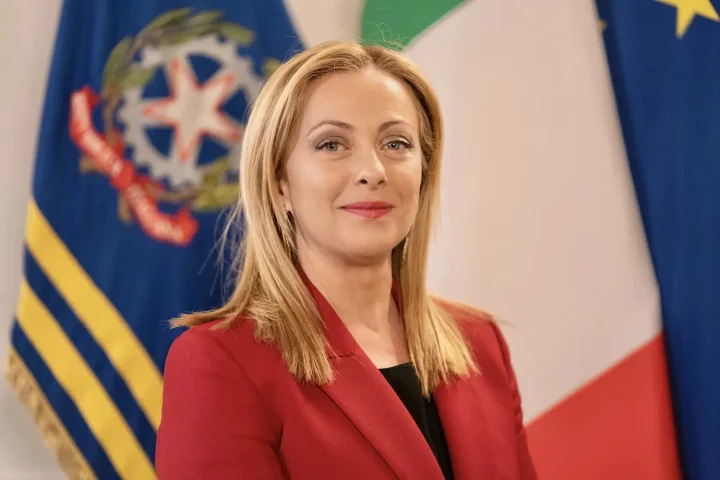Giorgia Meloni has emerged as one of the most prominent figures in contemporary Italian politics, shaping the nation’s political landscape with her leadership and ideological stance. As the leader of the Brothers of Italy (Fratelli d’Italia) party since 2014, she is the first woman to serve as Italy’s Prime Minister. This text provides a detailed examination of her political journey, leadership, and the policies that define her tenure.
Early life and political beginnings
Born on January 15, 1977, in Rome, Giorgia Meloni grew up in the working-class neighborhood of Garbatella. Her early life was marked by challenges, including her father’s departure when she was a child. Despite these difficulties, Meloni demonstrated an early interest in politics, joining the Youth Front (Fronte della Gioventù), the youth wing of the Italian Social Movement (Movimento Sociale Italiano, MSI), at the age of 15.
The MSI, a post-fascist party founded by supporters of former fascist leader Benito Mussolini, played a significant role in shaping her political ideology. Meloni quickly rose through the ranks, becoming a prominent figure in student movements and youth organizations. Her early political activities laid the foundation for her future leadership roles, emphasizing themes of national identity, sovereignty, and traditional values.
Leadexrship of Brothers of Italy (FdI)
In 2012, Giorgia Meloni co-founded the Brothers of Italy (Fratelli d’Italia), a right-wing nationalist party named after the opening words of the Italian national anthem. As the party’s leader, she positioned FdI as a defender of Italian sovereignty, cultural heritage, and conservative values. Initially a minor political force, the party gained traction under her leadership, capitalizing on growing dissatisfaction with mainstream political parties.
Meloni’s ability to connect with voters contributed to the party’s rise; she also tried to distance it from its fascist origins. By 2022, Brothers of Italy had become a dominant force in Italian politics, securing significant support in national elections. The party’s platform includes policies on immigration control, economic reform, and the preservation of Italy’s cultural identity.
In 2022, Italy’s Prime Minister Mario Draghi stepped down from his position and called for snap elections to be held. Giorgia Meloni, as the only figure of opposition, led the Brothers of Italy to a historic victory, forming a coalition government with other right-wing parties. Her appointment as Prime Minister marked a milestone in Italian history, as she became the first woman to hold this position.
A key aspect of Meloni’s platform is her stance on immigration. Her government has implemented stricter border control measures and policies aimed at reducing illegal immigration. These actions have sparked debates on balancing national security with humanitarian responsibilities.
Political Ideology and Controversies
Giorgia Meloni’s political ideology is rooted in national conservatism, emphasizing traditional values, national identity, and sovereignty. While her policies have resonated with many voters, they have also been the subject of criticism and controversy.
Meloni’s emphasis on preserving Italy’s cultural heritage and promoting conservative values has garnered support from right-wing voters. However, her critics argue that some of her policies risk alienating marginalized groups and undermining progressive social reforms.
On March 28, 2025, Giorgia Meloni enacted a new decree that significantly restricted the principle of jus sanguinis in Italian citizenship law. Previously, individuals with any Italian ancestor could claim citizenship, regardless of generational distance.
Take advantage of specialized assistance to secure your passport for a borderless future.
Under the new decree, eligibility is now limited to those whose parents or grandparents were born in Italy, marking a substantial shift in the criteria for obtaining Italian citizenship. Click here to learn more about the decree and io.citizenship’s official stance on its implications.
Media and Public Perception Meloni’s leadership style and rhetoric have drawn both praise and scrutiny. Supporters view her as a strong and decisive leader, while detractors have raised concerns about the implications of her policies on civil liberties and social cohesion.
Giorgia Meloni’s political career reflects her rise from grassroots activism to becoming Italy’s first female Prime Minister. Her leadership of the Brothers of Italy has reshaped the nation’s political landscape, emphasizing national conservatism and sovereignty. While her policies have sparked both support and controversy, her influence on Italian politics remains significant.






